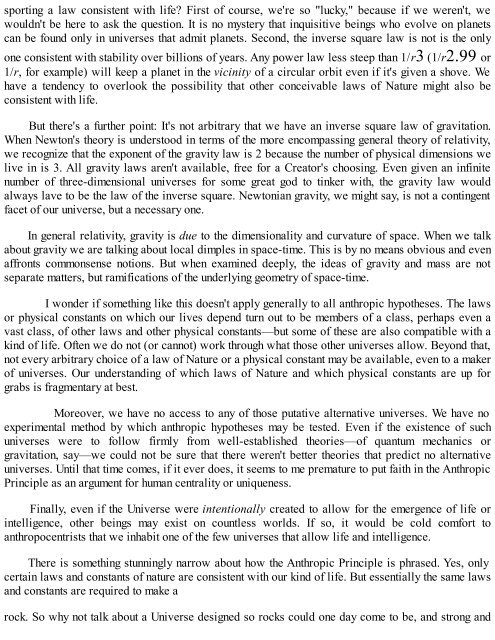Pale Blue Dot ( PDFDrive.com ) (1)
Create successful ePaper yourself
Turn your PDF publications into a flip-book with our unique Google optimized e-Paper software.
sporting a law consistent with life? First of course, we're so "lucky," because if we weren't, we<br />
wouldn't be here to ask the question. It is no mystery that inquisitive beings who evolve on planets<br />
can be found only in universes that admit planets. Second, the inverse square law is not is the only<br />
one consistent with stability over billions of years. Any power law less steep than 1/r3 (1/r2.99 or<br />
1/r, for example) will keep a planet in the vicinity of a circular orbit even if it's given a shove. We<br />
have a tendency to overlook the possibility that other conceivable laws of Nature might also be<br />
consistent with life.<br />
But there's a further point: It's not arbitrary that we have an inverse square law of gravitation.<br />
When Newton's theory is understood in terms of the more en<strong>com</strong>passing general theory of relativity,<br />
we recognize that the exponent of the gravity law is 2 because the number of physical dimensions we<br />
live in is 3. All gravity laws aren't available, free for a Creator's choosing. Even given an infinite<br />
number of three-dimensional universes for some great god to tinker with, the gravity law would<br />
always lave to be the law of the inverse square. Newtonian gravity, we might say, is not a contingent<br />
facet of our universe, but a necessary one.<br />
In general relativity, gravity is due to the dimensionality and curvature of space. When we talk<br />
about gravity we are talking about local dimples in space-time. This is by no means obvious and even<br />
affronts <strong>com</strong>monsense notions. But when examined deeply, the ideas of gravity and mass are not<br />
separate matters, but ramifications of the underlying geometry of space-time.<br />
I wonder if something like this doesn't apply generally to all anthropic hypotheses. The laws<br />
or physical constants on which our lives depend turn out to be members of a class, perhaps even a<br />
vast class, of other laws and other physical constants—but some of these are also <strong>com</strong>patible with a<br />
kind of life. Often we do not (or cannot) work through what those other universes allow. Beyond that,<br />
not every arbitrary choice of a law of Nature or a physical constant may be available, even to a maker<br />
of universes. Our understanding of which laws of Nature and which physical constants are up for<br />
grabs is fragmentary at best.<br />
Moreover, we have no access to any of those putative alternative universes. We have no<br />
experimental method by which anthropic hypotheses may be tested. Even if the existence of such<br />
universes were to follow firmly from well-established theories—of quantum mechanics or<br />
gravitation, say—we could not be sure that there weren't better theories that predict no alternative<br />
universes. Until that time <strong>com</strong>es, if it ever does, it seems to me premature to put faith in the Anthropic<br />
Principle as an argument for human centrality or uniqueness.<br />
Finally, even if the Universe were intentionally created to allow for the emergence of life or<br />
intelligence, other beings may exist on countless worlds. If so, it would be cold <strong>com</strong>fort to<br />
anthropocentrists that we inhabit one of the few universes that allow life and intelligence.<br />
There is something stunningly narrow about how the Anthropic Principle is phrased. Yes, only<br />
certain laws and constants of nature are consistent with our kind of life. But essentially the same laws<br />
and constants are required to make a<br />
rock. So why not talk about a Universe designed so rocks could one day <strong>com</strong>e to be, and strong and


